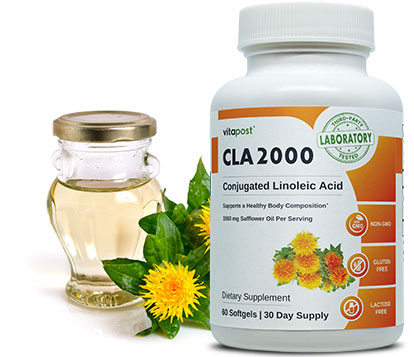In today's nutrition article, we will talk more about a very common sweetener that is used everywhere in the foods we eat every day, especially processed foods.
Sweetener – artificial sweetener, or artificial sugar – was produced with the original purpose of helping people reduce their natural sugar consumption and avoid the harmful effects of eating too much sugar. But does the sweetener really bring the benefits we expect? Find out with Bellyfatzone!
Artificial sugar, sweetener, or artificial sweetener… Whatever you like to call them, there is an undeniable fact that nowadays these sweeteners are receiving increasing attention from consumers, leading to countless heated debates surrounding their real effects on health.
On the one hand, they are thought to increase cancer risk and have a negative effect on blood sugar levels and gut health. But on the other hand, most health authorities consider them safe, and many people still take them to reduce their sugar intake and lose weight.
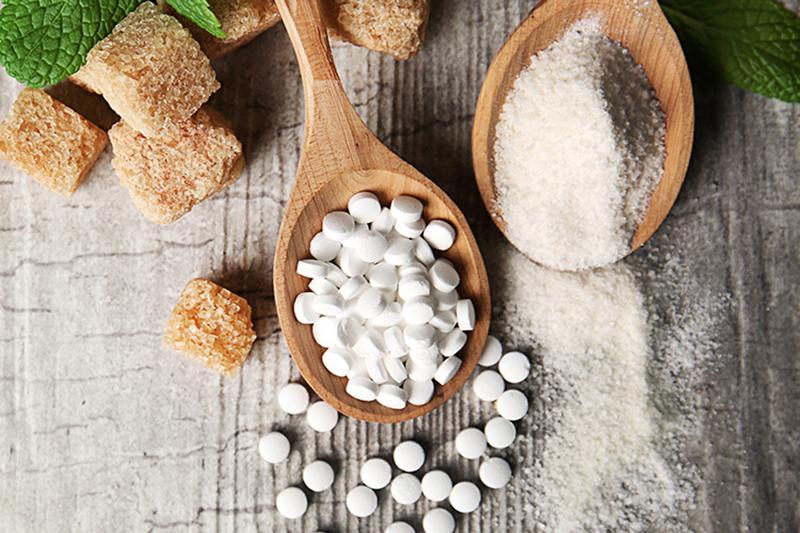
So where is the truth? This article will review and analyze the scientific evidence about the effects of artificial sweeteners on our health.
The studies mentioned in the article are all posted on the website of the National Center for Biotechnology Information (NCBI) – a reputable official website of the US National Center for Biotechnology Information (NCBI) science in general and medicine in particular.
1. What is artificial sugar really?
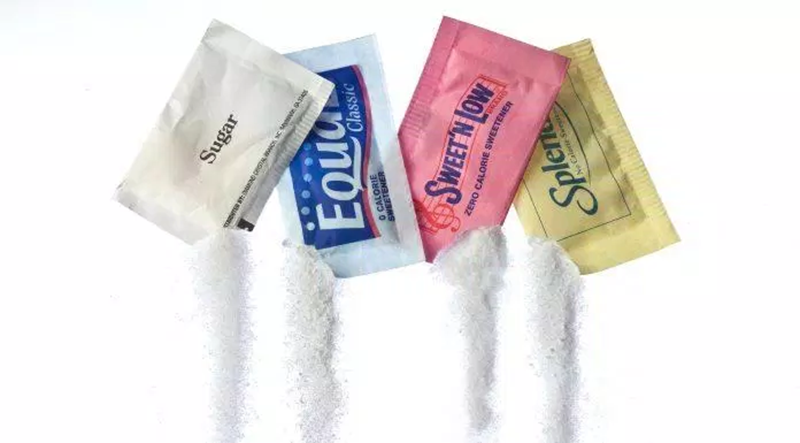
Artificial sweeteners, also known as “sugar substitutes,” are chemicals added to foods and drinks to sweeten them. People often call them “strong sweeteners” because they taste like regular table sugar but are thousands of times sweeter.
And while some sweeteners do contain calories, the amount needed to create the desired flavor is often so small that you'll barely add any extra calories.
2. How does artificial sugar work?

The surface of our tongue is covered with taste buds, each of which contains receptors that help perceive different tastes. When we eat, the molecules of food will come into contact with taste receptors, and if the two matches, a signal will be generated and transmitted to the brain allowing us to determine the taste of the food.
The sugar molecule, for example, would match up with a sweet-tasting receptor like a key and a lock, allowing the brain to identify sweetness.
Artificial sweeteners are structurally similar to sugar molecules enough that they can match the sweet taste receptor. But most of them are different from sugar in a way that makes it impossible for cells to break down for energy like natural sugars. That's why they taste sweet but don't add calories.
There are only a handful of sweeteners that are structured enough for the body to break down for energy, but because the amounts needed are often so small, we end up with almost no excess energy intake.
3. What types of artificial sugars are there?
To date, scientists have discovered many sweet-tasting chemicals, but only certain substances are used in the food industry. The following is a list of artificial sweeteners permitted for use in the US and the European Union:
- Aspartame: 200 times sweeter than sucrose (cane sugar), with the brands Nutrasweet, Equal, and Sugar Twin.
- Potassium acesulfame: 200 times sweeter than sucrose, suitable for cooking and baking, with the Sunset and Sweet One brands.
- Advantame: 20,000 times sweeter than sucrose, suitable for cooking and baking.
- Aspartame-acesulfame salt: 350 times sweeter than sucrose, under the brand name Twinsweet.
- Cyclamate: 50 times sweeter than sucrose, suitable for cooking and baking. However, this substance has been banned for use in the US since 1970.
- Neotame: 13,000 times sweeter than sucrose, suitable for cooking and baking, under the brand name Newtame.
- Neohesperidin: 340 times sweeter than sucrose, suitable for cooking, baking, and mixing with sour foods. This substance is not licensed for use in the United States.
- Saccharin: 700 times sweeter than sucrose, with brands Sweet'N Low, Sweet Twin, and Necta Sweet.
- Sucralose: 600 times sweeter than sucrose, suitable for cooking, baking, and mixing with sour foods, under the brand name Splenda.
Summary: Currently, many types of sweeteners have been discovered, but not all of them are accepted for use worldwide. The most common ones are aspartame, sucralose, saccharin, neotame, and acesulfame potassium.
So you have a relatively complete understanding of the “origin of origin” of artificial sweeteners. Now we will learn in turn their impact on human health.
4. The relationship between sweeteners and weight and cravings
Artificial sweeteners are a familiar choice for people trying to lose weight. However, their impact on appetite and weight varies from study to study.
For the appetite

Some people believe that sweeteners can actually increase appetite and promote weight gain. They suggest that these substances may not be able to block the necessary response in the brain to make you feel satisfied after eating. Because they do not contain energy like other common sweeteners, they still make us feel as hungry as when we have not eaten.
In addition, some scientists suggest that if you want to fill your stomach, you will have to consume foods that are artificially sweetened in larger amounts than when you eat foods sweetened with regular sugar. It has even been suggested that sweeteners can cause cravings for sugary foods.
While these theories sound plausible, recent research does not support the idea that artificial sweeteners increase hunger or increase calorie intake.
In fact, studies have documented that participants using sweeteners reported feeling less hungry and consuming fewer calories than when consuming foods containing sugar.
Recent studies have found that replacing regular sugar with artificial sweeteners can reduce hunger and reduce calorie consumption.
Impact on weight

With regard to weight control, several observational studies have shown a link between artificial sweetener consumption and obesity. However, more precise studies have shown that artificial sweeteners can actually lead to weight loss, fat loss, and waist circumference.
Studies also show that replacing regular soft drinks with sugar-free varieties can lower your body mass index (BMI) by 1.3 to 1.7.
What's more, using foods that are artificially sweetened in place of sugar can reduce your total daily calorie intake. Many studies lasting from 4 weeks to 40 months have shown that it can help to lose up to 1.3 kg of weight.
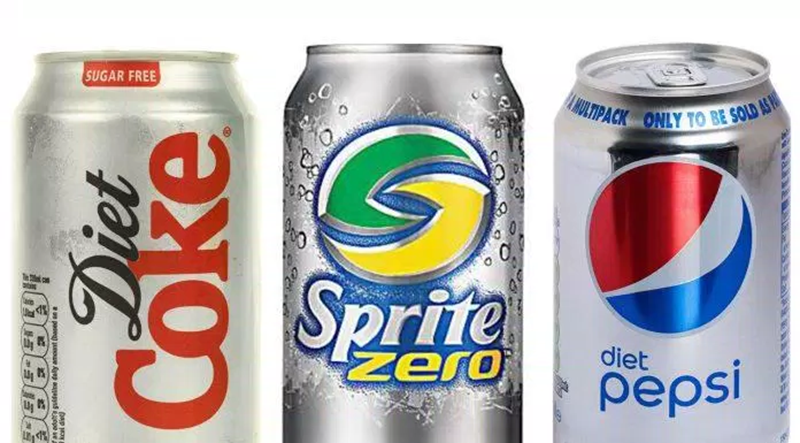
Artificially sweetened beverages easily become the choice of people who want to reduce their daily sugar intake.
However, those “diet soft drinks” won't help you lose weight at all if you make up for it by eating more sweets. If diet sodas increase your cravings for sweets, it's best to stick with plain water.
Replacing regular sugary foods and drinks with artificially sweetened ones can help you lose a little bit of weight.
5. Relationship with diabetes
Diabetics may benefit from using artificial sweeteners, which give them a sense of satisfaction without raising blood sugar. However, some studies show that consuming diet drinks can increase the risk of diabetes by 6 to 121%.
The results may sound contradictory, but it's important to note that all of these studies are observational, meaning they can't prove a causal relationship that artificial sweeteners cause diabetes. only concluded that people who are prone to type 2 diabetes are also diet soda drinkers.
On the other hand, many studies have shown that artificial sweeteners do not affect blood sugar levels or insulin levels in the blood.
So far only one small study has found a negative effect: women who drank an artificial sweetener right before a sugary drink had 14% higher blood sugar and high blood insulin 20% more than those who drank filtered water before.
However, that can be partly explained by the fact that these people are not used to using artificial sweets. In addition, sweeteners can also act differently depending on the age and racial genetic characteristics of the user.
For example, research has shown that artificial sweeteners have a stronger effect on younger Hispanics. This may be related to the undesirable effects observed in the women mentioned above.
Although not completely consistent, the current evidence is quite supportive of the use of artificial sweeteners in diabetics. However, more studies are needed to assess their long-term effects on different populations.
Artificial sweeteners can help diabetics reduce the amount of sugar in their diet. However, more research is needed to understand their impact on different populations.
6. Artificial sweeteners and metabolic syndrome
“Metabolic syndrome” is a term used to refer to a collection of health problems that include high blood pressure, high blood sugar, abdominal obesity, and dyscholesterolemia. These conditions increase the risk of chronic diseases such as stroke, heart disease, and type 2 diabetes.
Some studies suggest that people who regularly drink diet sodas have a 36% higher risk of metabolic syndrome. However, better quality studies have shown that these drinks have no impact on health, or have any positive effects.
A recent study was conducted to investigate this issue, in which participants who were both overweight or obese were divided into groups with different types of drinks, including regular soft drinks, soft drinks diet, water, and semi-skimmed milk.
After six months of maintaining the same beverage, the diet soft drink group had a significant difference compared with the regular soft drink group.
They had 17-21% less weight, 24-31% less belly fat, 32% lower blood cholesterol and 10-15% lower blood pressure. Filtered water also has the same effect when compared to regular soft drinks.
Bottom Line: Artificial sweeteners are less likely to promote metabolic syndrome. Replacing sugary drinks with artificially sweetened beverages can actually reduce the risk of a number of health problems.
7. Artificial sweeteners and gut health
Gut microbiota plays a vital role in the health of the whole body, and poor gut health is linked to a multitude of problems, including weight gain, difficulty controlling blood sugar, diabetes, and obesity. metabolic syndrome, a weakened immune system, and inadequate sleep.
The specific composition and activity level of the gut microbiota varies from person to person and appears to be influenced by the type of food we eat, including artificial sweeteners.
According to one study, the sweetener saccharin unbalanced the gut flora of four out of seven participants who were unfamiliar with the substance. These four also experienced poor glycemic control that persisted for five days after taking the artificial sweetener.
Not stopping there, when their gut bacteria were introduced into the lab rats, these mice also suffered from difficult blood sugar control. In contrast, mice that received bacteria from people who had no adverse reactions to the artificial sugars showed no change in blood sugar control.
While the results are exciting, this is the first and only study to date to demonstrate these effects in humans. More research will be needed before we can draw firm conclusions about the link between artificial sweeteners and gut health.
Artificial sweeteners disturb the balance of gut bacteria, which can increase the risk of disease. However, more studies are needed to confirm this.
8. Artificial sugar and cancer risk

The issue, which has fueled debate since the 1970s, was sparked by the results of animal studies showing an increased risk of bladder cancer in rats fed very large amounts of food. saccharin and cyclamate.
Fortunately, the metabolism of saccharin in rats and humans is different. Since then, more than 30 human studies have found no link between artificial sweeteners and cancer risk.
One study followed 9,000 people for 13 years and analyzed how much sweetener they consumed. After calculating, the researchers found no link between artificial sweeteners and the risk of many types of cancer.
A recent review analyzed studies published over the previous 11 years and ultimately found no link.
This result was also evaluated by the US and European authorities, all of whom agreed that artificial sweeteners, when used in reasonable amounts, do not increase the risk of cancer.
The only exception is cyclamate, which was banned in the US following the bladder cancer study in mice mentioned above. Although subsequent animal studies have shown no association with cancer, cyclamate has never been re-licensed.
Bottom Line: According to current scientific evidence, artificial sweeteners do not increase the risk of cancer in humans.
9. Artificial sweeteners and oral health
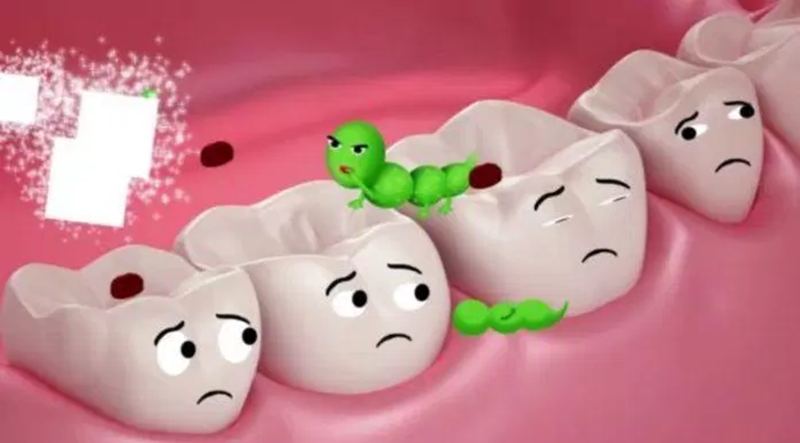
Cavities are created when bacteria in the mouth ferment sugars to form acids that destroy tooth enamel. Unlike sugar, artificial sweeteners do not react with bacteria in the mouth, and therefore do not form acids or cavities.
Research also shows that sucralose causes less tooth decay than sugar. That is why the US Food and Drug Administration (FDA) has authorized products containing sucralose to claim that they reduce tooth decay.
The European Food Safety Authority (EFSA) also states that all artificial sweeteners, when used as a substitute for sugar, neutralize acids and help prevent tooth decay.
Bottom Line: Artificial sweeteners, when used to replace sugar, reduce the risk of tooth decay.
10. Association of aspartame with headache, depression, and epilepsy
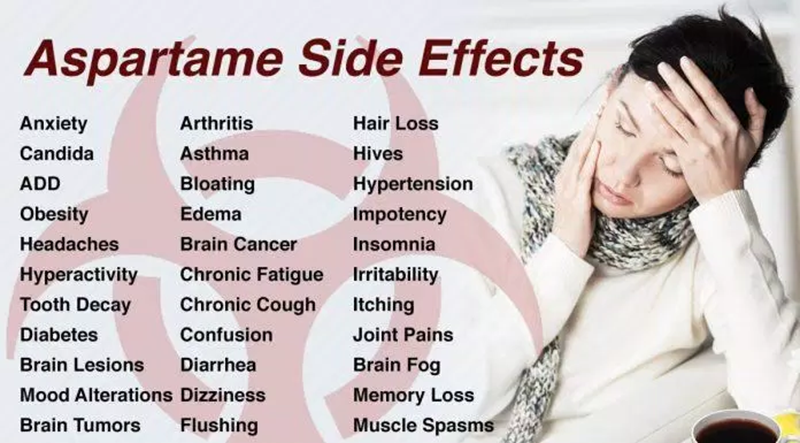
Some artificial sweeteners can cause unpleasant symptoms such as headaches, depression and seizures – at least in some people with sensitive skin.
Although most studies have found no link between aspartame and headaches, two studies have noted that some people are more sensitive than others.
The same is true for depression caused by aspartame. For example, people with depressive disorders, mania, bipolar disorder… may be more likely to experience depressive symptoms when taking aspartame.
Finally, artificial sweeteners do not increase the risk of epilepsy in humans. However, one study reported increased brain activity in children with absence epilepsy.
Artificial sweeteners do not cause headaches, depression, or seizures in most people. However, a small number of people may be more sensitive to these symptoms.
11. Safety and side effects

Artificial sweeteners are generally considered safe for human consumption. They are carefully tested and controlled by the US and international agencies to ensure their safety when introduced into the body.
However, there are some special people who need to avoid using sweeteners. Aspartame, for example, contains the amino acid phenylalanine, which cannot be metabolized by people with the rare metabolic disorder phenylketonuria (phenylketonuria). Therefore, these people should avoid aspartame.
In addition, some people are allergic to a group of compounds that include saccharin called sulfonamides. In these people, saccharin can cause shortness of breath, skin rash, or diarrhea.
Artificial sweeteners are generally considered safe but should be avoided in people with phenylketonuria and those allergic to sulfonamides.

Conclude:
According to the available scientific evidence, artificial sugars pose very few health risks and even have benefits for weight loss, blood sugar control, and oral health. These substances are especially beneficial if used to reduce the amount of sugar added to food every day.
However, the likelihood of adverse side effects may vary from person to person. Some people may experience discomfort or negative effects after using artificial sweeteners, although they are safe and not harmful for most people.
View more:
- Is Vitamin C Good for Gym?
- What Is Hemp Protein? How to Use It Effectively?
- What Is Protein? How Much Is Enough And Used Properly
After all, science is always changing and finding new discoveries on old topics. Let's wait and see how the future will judge the true truth of artificial sugar. Will they be “heroes” or “criminals” for health? Time will answer!
Don't forget to visit Bellyfatzone next time to find out lots of useful information!





